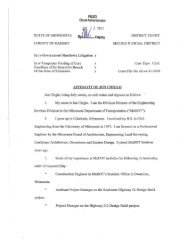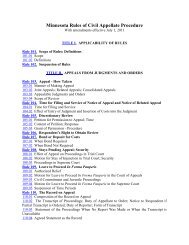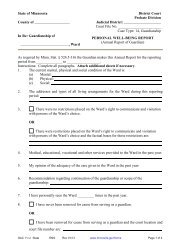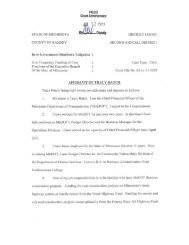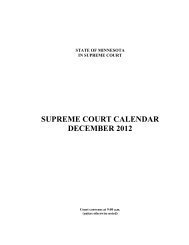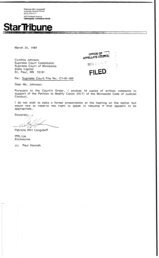2001-01-26 Harley-Davidson Response - Minnesota Judicial Branch
2001-01-26 Harley-Davidson Response - Minnesota Judicial Branch
2001-01-26 Harley-Davidson Response - Minnesota Judicial Branch
You also want an ePaper? Increase the reach of your titles
YUMPU automatically turns print PDFs into web optimized ePapers that Google loves.
all the claims on the grounds that the claims involved a common question of fact - the mothers’<br />
ingestion of DES. The court properly rejected consolidation due to the fact that each claim<br />
involved independent and unique issues of fact. The Court recognized that allowing claimants to<br />
bolster their case by parading numerous claimant’s before the jury would be prejudicial to the<br />
defendant. The court reasoned as follows:<br />
One could scarcely imagine actions less amenable to consolidation in a<br />
single suit than the myriad suits which have been brought before this court for<br />
redress of DES-related injuries.<br />
While the minimum statutory requirement of “a common question of law or<br />
fact,” may be satisfied by the common thread of DES ingestion whi6h runs through<br />
every case, the particular circumstances surrounding each mother’s use of the drug,<br />
and each daughter’s complaints arising from that use, are so diverse as to render<br />
consolidation impractical. Where “individu& issues predominate”, consolidation,<br />
even for the purpose of joint trial, is not wise. This has been recognized in cases<br />
involving as few as two plaintiffs, or even one plaintiff involved in two separate<br />
accidents. Presentation of the numerous plaintiffs’ claims before a single jury<br />
would also tend to unfairly bolster the case against the defendants in an<br />
impermissibly prejudicial manner. Consolidation is, therefore, clearly unavailable.<br />
Id. at 43 1-432.<br />
In the present case, the particular circumstances surrounding each claimant’s transaction<br />
with Twin Cities <strong>Harley</strong> <strong>Davidson</strong> are so diverse as to render consolidation prejudicial and<br />
impractical. The claims asserted by the petitioners in the present case are based on alleged oral<br />
representations by different Twin Cities <strong>Harley</strong>-<strong>Davidson</strong> salespeople, at different times, and at<br />
separately managed locations. Each of these allegations necessarily hinges upon an independent,<br />
individualized, factual determination of what each claimant was told, and by whom. Moreover, to<br />
sustain a misrepresentation claim, a plaintiff must be able to establish that she rea Ia nably relied on<br />
the supposed misrepresentation. This necessarily involves an independent tid individualized<br />
factual determination into each claimant’s background, experience, education, training, etc.<br />
7





